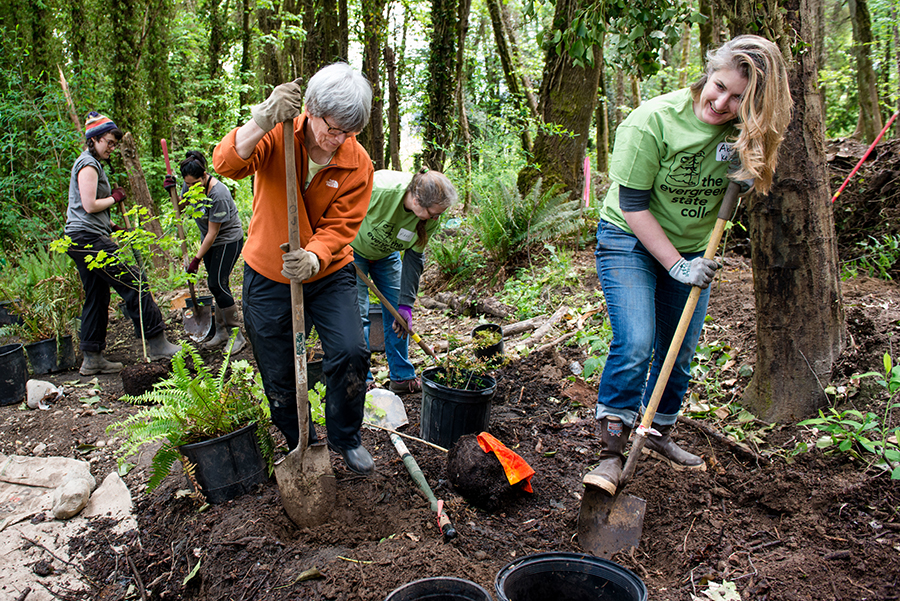About Environmental Studies
By gaining practical skills and making deep connections, Evergreen students become world leaders in environmental problem solving, marine science, ecology, conservation, and more. Join us and start your journey.
Whether you want to work in forest conservation, explore the complexities of marine life, become an expert on environmental policy, or anything else related to environmental science, this Path will set you up with the skills you’ll need after college.
On this Path, you’ll chart your course through an incredible array of programs and other learning opportunities that will prepare you for how environmental work happens in the real world. You have the freedom and support to tailor your education to your passions.
As an undergrad, you’ll have the chance to dive deep into a topic and learn the scientific process through hands-on work in programs and labs. With the guidance of faculty, many students on this Path have published findings in peer-reviewed journals. This can be a game-changer that helps you kickstart your career or land a position in a competitive graduate school program.
Prepare for Careers and Graduate Studies Beyond this Path
Career Opportunities
- Biodiversity analysis
- Botany
- Carbon cycle science
- Climate science
- Climate justice
- Conservation Biology
- Data Science
- Ecology
- Environmental law
- Environmental monitoring
- Environmental policy
- Freshwater Science
- Natural history
- Marine biology
- Mycology
- Political ecology
- Soil science
- Sustainable Forestry
- Sustainable Agriculture
- Toxicology
- Zoology
Graduate School Opportunities
- Conservation biology
- Ecology
- Environmental justice
- Environmental social science
- Marine biology
- Master of Environmental Science
- Master of Environmental Studies
- Natural resource management
- Urban ecology
- Vertebrate biology
Path Concentrations
The Environmental Studies Path offers programs in a variety of fields of study that you can mix and match. These are some areas of emphasis you can pursue on this Path.
- Ecosystem science: Programs in ecosystem science focus on the movement and distribution of matter and energy, and major global environmental issues like climate change. Learn to utilize math, chemistry, biology, and science communication to tackle some of the greatest environmental issues facing the planet!
- Organismal biology: Get hands-on with field-based studies in animal behavior, biodiversity, and natural history. Working with plants, fungi, fish, birds, mammals, and more, you’ll connect the molecular and biochemical worlds to the evolutionary process and learn to analyze lifeforms from land and sea.
- Natural resources: Discover how human and earth systems are connected by studying forestry, conservation biology, sustainability, and more. Explore problems such as the climate crisis, species extinctions, and pollution with practical tools from different disciplines.
Field Studies
Evergreen’s location in the heart of the Pacific Northwest gives you easy access to mountain ranges, rainforests, the Puget Sound, the Pacific Ocean, and more. Programs on this Path regularly take advantage of world-class natural destinations to provide hands-on experiences you’ll never forget.
Many Evergreen programs also put you in conversation with Native nations and tribes of the Pacific Northwest to learn from them about the land, waters, and treaties of the region.
Labs and Instruments
Get hands-on experience in chemistry and biology labs where you’ll learn the collaborative and analytical skills professional scientists use every day. In programs on this Path, you’ll have access to labs for:
- Molecular biology
- Organic chemistry
- Water quality analysis
- Environmental analysis
- Computer applications
The independence and support you get as an undergrad scientist at Evergreen is a one-of-a-kind experience. In programs on this Path, you’ll learn to prepare and run your own samples and get to know advanced scientific instruments well enough to put them on your resume.
Graduating with skills in using these instruments will give you an edge over competition when applying for graduate schools, research opportunities, and jobs in the field.
Learn more about Science Labs and Field Facilities
Individual Study
Faculty are passionate about helping you study what you’re most interested in. Sometimes that means letting you step out of the classroom for an independent experience such as internship or a learning contract of your own design.
Every year, Evergreen students take on life-changing internships with local environmental organizations or government institutions such as the Washington State Legislature. An opportunity like this could launch you into a career in the field where you can make a lasting impact on environmental work in Washington state and beyond.
Learn more about Individual Study
Forest, Beach, and Gardens
Evergreen’s campus isn’t just a breathtaking natural setting, it’s a living laboratory you can learn from every day. The 1,000 acres of campus forest is the perfect place to learn how to measure the forest ecosystem and how to manage and conserve these vital natural areas.
Evergreen’s beach gives you amazing opportunities to get hands-on with marine biology and aquatic sciences. You’ll learn to identify and analyze marine life and gain an understanding of human impacts on the shorelines and oceans.
Students on this Path are passionate about working in the earth. You’ll find lots of opportunities to work with fellow students, staff, and faculty while learning about the many types of gardens on campus.
- Evergreen community gardens near campus housing
- Demeter’s garden
- Ethnobotanical garden at the Indigenous arts campus
- Shellfish garden
- Medicinal herb garden
The Organic Farm
The Organic Farm is a five-acre living laboratory that has helped launch countless student careers. The farm serves many programs from both the Environmental Studies Path and the Food and Agriculture Path.
Skills you can gain on the farm include:
- Organic growing methods
- Crop botany
- Planting, maintaining, and harvesting crops
- Animal husbandry (chickens and bees)
- Permaculture design process for food, water, and energy systems
- Sales, marketing, and business
- Creating value-added products
- Integrated pest management
- Teamwork, leadership, and communication skills
Learn more about the Organic Farm
Check out related Courses and Programs in the Academic Catalog
